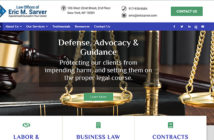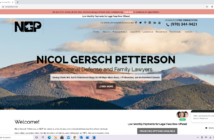5,500 Facebook likes, 27,700 Twitter followers, over 500 LinkedIn connections, and 4,900 Google+ followers keep this Miami attorney front and center.
David Edelstein is criminal defense lawyer in Miami, FL. He got his start as an Assistant Public Defender with the Miami-Dade County Public Defender’s Office then launched his own firm, The Edelstein Firm. He handles both state and federal cases across a number of practice areas from DUIs to drug trafficking to homicide.
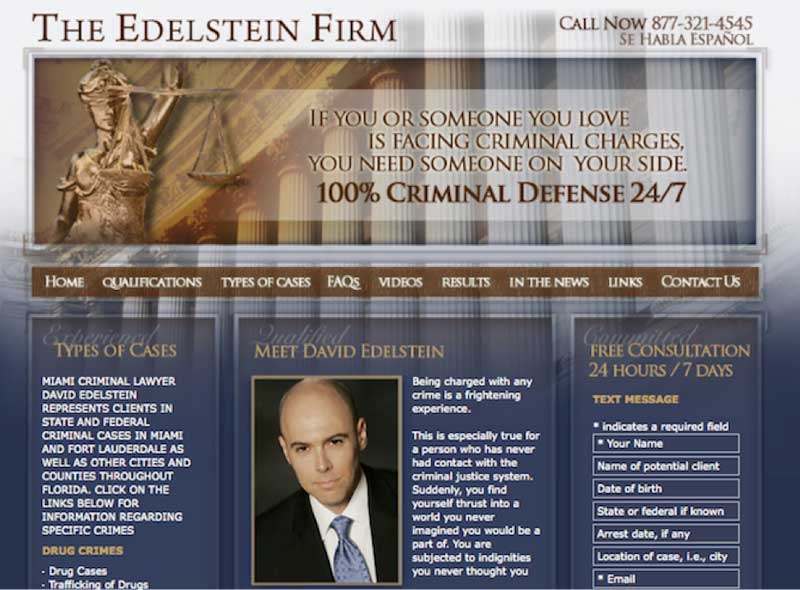
Edelstein got his start in online marketing in 2004-2005. “Online marketing back then was all about talking loud instead of refining the message to be relevant,” he says. A lot of what he saw brought to mind what marketing expert Seth Godin dubs a meatball sundae. “A lot of them seemed to think that if they just talked loud enough, they’d get people’s attention,” Edelstein says, but marketing yourself online is really “not about you or your accomplishments.”
He’s currently in the process of redesigning his website to better communicate with his clients. It will be, “All about the client and where they are at this point in time that they need my services,” he says. His new site will convey that he understands his clients’ needs and with a particular emphasis on where they are emotionally. “What is it like being in the position of needing my services? What it’s like when you’re under investigation by the police or have been arrested?”
“You have to start the conversation there,” he says. “People are scared, vulnerable, fearful, and emotionally, you need to start that conversation.”
A big part of starting that conversation for Edelstein now involves social media.
Building a Brand with Social Media
Though Edelstein used to receive most of his leads through his website, social media has taken on a more important role over the past few years. “It used to be that link building was the big thing for SEO,” Edelstein says, but that’s “pretty much dead” now. The exception being how social media helps your site rank thanks to mentions and shares. That’s a form of link building and a social presence is becoming increasingly important for SEO overall. “Everyone’s connected and there’s always a conversation,” he says, which takes some of the dominance away from traditional searches.
“If you’re out there and engaging people in a topically relevant way, then there’s a good chance they’ll find you without having to use a search engine.”
But SEO shouldn’t be viewed as a separate strategy now. “Public relations, link building, social media — it’s all come together under one umbrella,” he says.
“If you’re doing it right, you’re branding and you have a consistent voice, which helps people identify you with your service,” he says. But what’s most important about this effort is that you stay “top of mind” when a potential customer needs your service. Essentially, you’re extending your real-live network into the virtual space.
Edelstein has well-established presences on Facebook, Twitter, Google+ and LinkedIn and he spent some time telling me about his strategy for each site.
“I started on Facebook four to five years ago,” Edestein says, “and I think I was one of the first attorneys to create a page and spend a lot of money on advertising.” He built up a fan base of mostly local people and made it a priority to engage with them on a regular basis. “If people are going to have good feelings about you, it’s better to engage with them on their own terms,” he says. And that’s precisely what social media offers. If you can offer useful info at the same time? Excellent. And if you can be likable and behave like a real human being on top of it all? You’re golden.
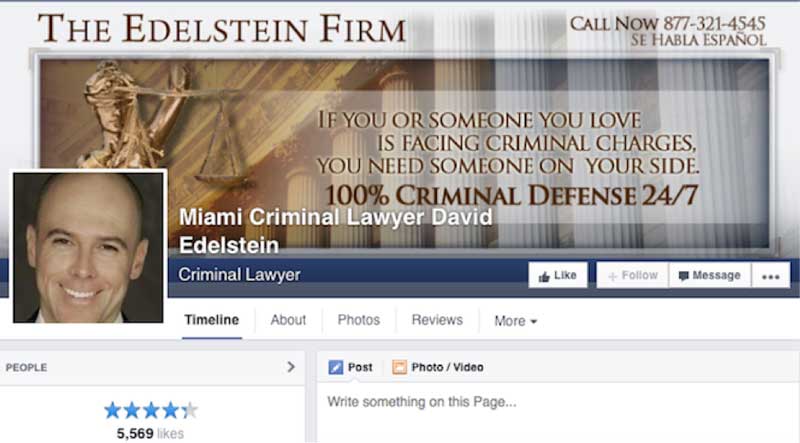
Authenticity is essential. You have to share some personal things on occasion so people can better connect with you. “Being a monolithic brand doesn’t work,” he says, noting that even the biggest corporations out there can and do still connect with their customers on social, so there’s really no excuses.
On Facebook, Edelstein tries to bring his personality and voice to the table while conveying the facets of himself he wants his potential clients to know about. “You want mostly local followers unless where you are geographically doesn’t matter,” he says, adding that he’s never purchased followers and built his 5,500 likes naturally and through the use of Facebook ads. “Some will buy [likes]for the social proof aspect, but you’re better off doing it legitimately,” he says. At the end of the day you’re, “either engaging people or not.”
Once you start to build a following, Edelstein says you absolutely must use advertising to boost your posts. “It’s hard to get organic views now,” he says, referring to Facebook’s recent changes that make it so only a paltry percentage of a page’s followers actually see its posts in their feeds.
He offers a few other tips for succeeding on Facebook:
- Hardly ever talk about yourself.
- Never say, “If you’re arrested, call me.”
- Just text isn’t going get that much engagement, you need photos, too.
- Don’t be afraid of controversy.
The subject matter of his posts varies but he often posts random thoughts, witty quotes, and his opinion on cases that are getting a lot of media attention. He also tries to provide insights into subjects that people who aren’t defense attorneys might not think about. He brings his unique perspective to everything he posts and isn’t afraid to be political. “Part of my voice is the voice of the defense attorney and if there’s a rush to judgment in any particular case, I try to be the voice of reason,” he says, adding that he’s not afraid to sometimes be the “fly in the ointment” of cops and prosecutors.
On Twitter, Edelstein’s strategy is again locally focused. “It’s best for me to have as many local followers as I can,” he says, but makes exceptions when connecting with other attorneys from all around the country. He views them as potential sources of referrals. “I generally try to [follow people from]South Florida unless there’s a topically relevant commonality with me and the person,” he says.
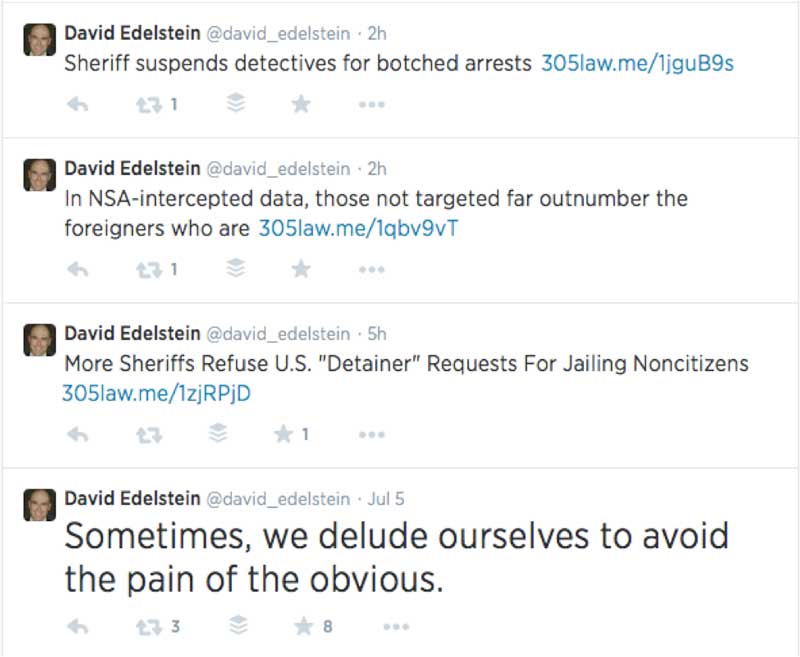
He currently has 27.7K followers on his account @david_edelstein. “The significance of each tweet is minimal compared to a Facebook post,” he says, noting that sometimes it’s about timing in terms of what receives a lot of mentions and retweets. “It’s like a needle in a haystack,” he says, which means you have to tweet more often. But he’s quick to point out that you shouldn’t tweet a lot all at once. That would just annoy your followers.
Instead, he uses Buffer, the social media app that lets you establish a sharing schedule in advance. “I’m a curator,” he says. “I try to retweet news stories that people will find interesting and engaging and I go through my RSS reader and find things that are worth sharing.” Then he adds these content pieces to his Buffer queue so they will be automatically shared at targeted times of the day.
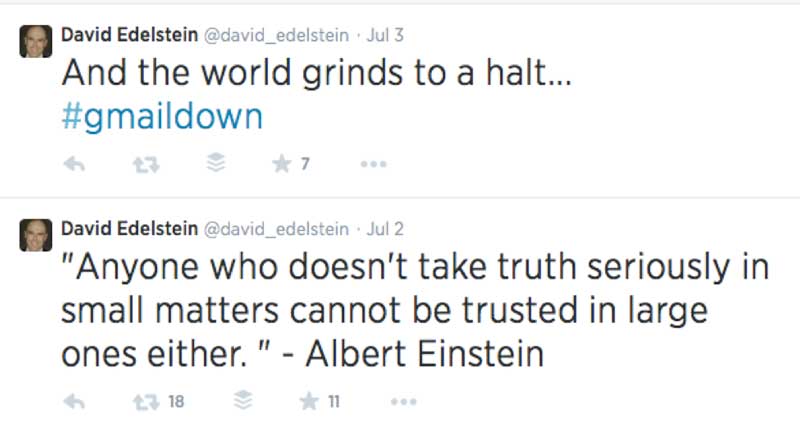
He filters what he decides to share. For instance, “When I share quotes, it’s not something that’s necessarily legal related but it’s a wise or witty quote that people can understand how it would be related to what I do—or it reinforces who I am,” he says. A lot of what he shares has to do with, “lies, truth, and justice,” he says.
These content pieces are paired alongside personal tidbits that reflect his personality or his viewpoint on life. He also shares articles related to his practice area — “privacy and technology, fourth amendment rights, the NSA, Snowden, and the intersection of technology and constitutional rights.”
Google+
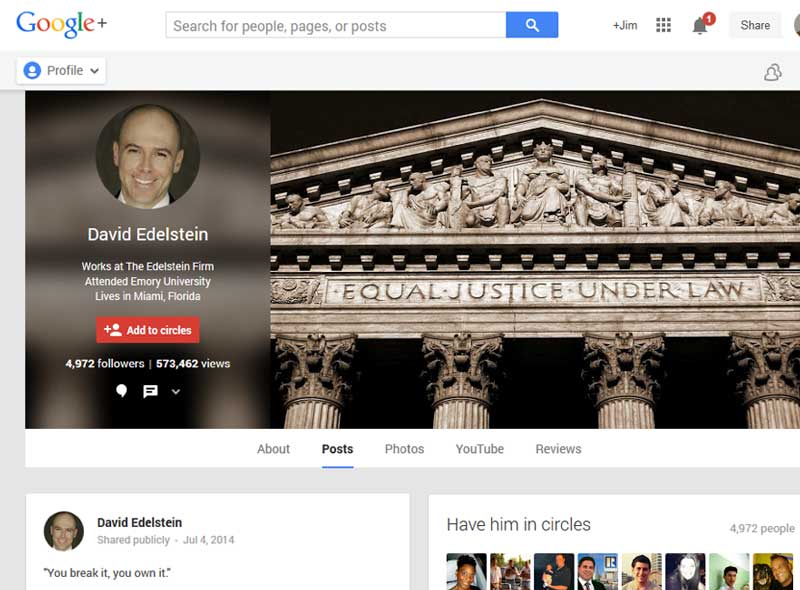
Edelstein uses Google+ in a cross-promotional capacity, often sharing what he posts on Facebook there. “I’m not as concerned about over posting with G+,” he says and sometimes posts more tech-oriented content, “that’s not necessarily related to my role as a defense attorney,” primarily because there are a lot of people in the tech industry with a presence on this social network. “If I’m railing on Android, I’ll post it there,” he says.
LinkedIn is all about connecting with people you know personally and professionally. Then you leverage those connections to connect with people one step outside of your personal network. But Edelstein doesn’t play the LinkedIn game by the rules. “I try to limit it to local people or other lawyers for the most part,” he says, but not everyone he’s connected to is someone he trusts or even knows. His reasoning? “Anyone could be a client,” he says, so he tries to be top of mind for as many people as he can.
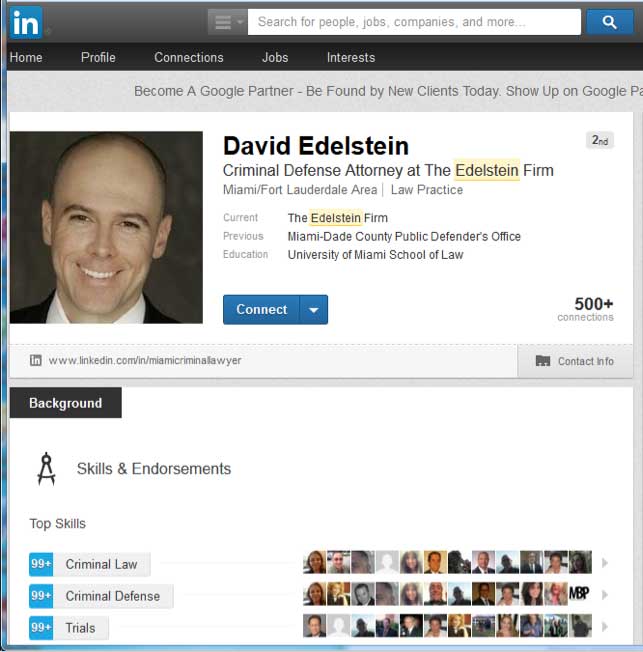
In terms of what he posts there, he’s more “circumspect and mindful” that it’s a very professional network. He might change the wording on some of his posts or tone down rants.
Edelstein also uses advertising on LinkedIn and calls it a “good value.”
Parting Advice
Before signing off, Edelstein offered this parting advice:
“It’s difficult to outsource your marketing. You really have to be careful who you choose to help you if you’re not going to do it yourself. Even if you’re hiring people, you still have to be involved. You can’t just pay someone and walk away. Nobody understands your business or your clients and their needs like you do. I know what my potential clients need, how they’re feeling emotionally, and what they’re going through. If someone doesn’t have knowledge of that, how are they going to effectively market for you? You have to be involved in the process. Unless you have a huge budget and hire really good people that can internalize and understand your business, it’s not going to work.”
This applies even more so to social media. “You can’t outsource social media,” Edelstein says, “It’s all about your voice and connecting with people. It’s the exception where someone has a successful campaign that they’re not involved in themselves.”

